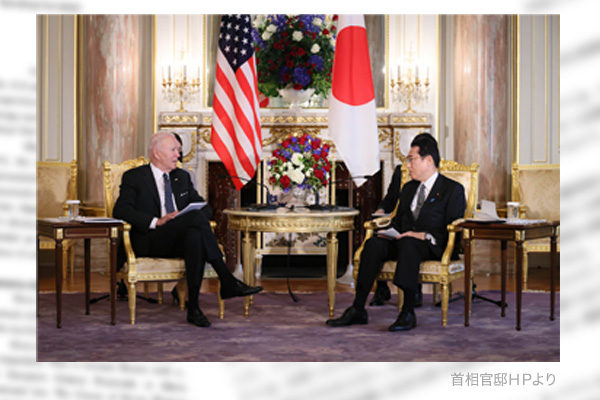Japanese Prime Minister Fumio Kishida at his talks with U.S. President Joe Biden on May 23 stated his determination to fundamentally reinforce Japan’s defense capability and secure “substantial increase” of its defense budget, as clarified in their joint statement. On January 21, Kishida only said to the House of Councilors, “I will book defense expenditure according to needs as a result of realistic discussions, without having a conclusion or target amount of money in advance.” The latest remark indicates a step forward from the previous one. But he still failed to give any specific figure.
Kishida failed to specify defense spending as 2% of GDP
In policy recommendations to the prime minister in late April, the ruling Liberal Democratic Party’s Research Commission on Security (chaired by former Defense Minister Itsunori Onodera) said Japan should aim to achieve a necessary budget level within five years in consideration of the North Atlantic Treaty Organization’s target of increasing each member’s defense spending to 2% or more of its gross domestic product. Onodera visited the United States earlier in May and explained the recommendations to U.S. officials and experts, who generally welcomed the recommendations. But some of them gave their impressions that defense spending at 2% of GDP would not be sufficient for Japan for which a security situation is severer than for Germany.
After Russia’s aggression against Ukraine, Germany decided to increase its defense spending from 47 billion euros (about 6.11 trillion yen), equivalent to 1.5% of its GDP, in fiscal 2021 to 2% or more of its GDP. Japan’s defense budget in the current fiscal year topped 6 trillion yen for the first time, but it is still limited to 1.09% of its GDP. The LDP recommendation that Japan’s defense spending be raised to 2% of GDP within five years represents a slower increase than in Germany. But the LDP’s junior coalition partner Komeito party has shown its cautious attitude even toward such moderate recommendation. As the prime minister declared “substantial increase” at talks with the U.S. President, Japan might have to increase its defense spending to the German level at least, a government official said. Kishida will be required to give a clear path for defense spending increase as did Germany.
Don’t be complacent with U.S. defense commitment
Kishida told Biden that he would host next year’s summit of Group of Seven industrial democracies in Hiroshima. “There is no other venue as fitting as Hiroshima to demonstrate our commitment to peace,” Kishida said at his joint press conference with Biden. I raised opposition to the Hiroshima G7 summit in this column on May 16. While it is important to pursue the abolition of nuclear weapons, nuclear deterrence is getting more important at a time when Russia as a permanent member of the United Nations Security Council threatens nuclear attacks, with China building up nuclear capabilities and North Korea equipping itself with nuclear arms.
In the Genron TV Internet program hosted by JINF President Yoshiko Sakurai on May 20, former Prime Minister Shinzo Abe noted Onodera during his U.S. visit was told that the U.S. would have prior consultations with NATO countries and Japan on its use of nuclear weapons. This should be interpreted as indicating that Japan has to look at realities and has joint responsibilities for the use of nuclear weapons, Abe said. Japan should not leave the U.S. nuclear umbrella for Japan entirely up to the U.S. but be prepared to share responsibilities with that country.
An alliance is based on mutual trusts. While President Biden voiced his full commitment to the defense of Japan, the period in which Japan was complacent with the U.S. commitment has been over.
Takashi Arimoto is a Planning Committee member at the Japan Institute for National Fundamentals and publisher of Monthly Magazine SEIRON at the Sankei Shimbun newspaper.


